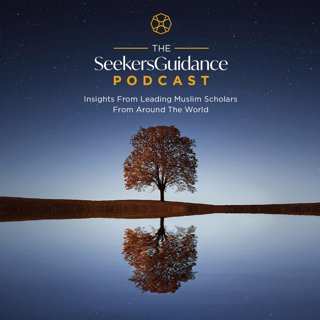
22: Repentance, Patience & Gratitude – Renewal by the Book: Quran Tafsir Based on Imam Ghazali’s Ihya – Shaykh Faraz Rabbani
In this lesson, Shaykh Faraz, continues the series Renewal by the Book giving an overview of the chapter on repentance, patience and gratitude from Imam Ghazali’s along with a tafsir of the verses of the Quran that correspond to it. In this lesson, Shaykh Faraz looks at verse 13 from chapter 34 in the Quran. Often times these three qualities: repentance, patience and gratitude are thought of to be enacted at specific times, like repenting when one does something wrong. However, one should be in all three states at all times and shouldn’t tie them to life events. اعْمَلُوا آلَ دَاوُودَ شُكْرًا ۚ وَقَلِيلٌ مِّنْ عِبَادِيَ الشَّكُورُ "Work, O family of David, in gratitude." And few of My servants are grateful. [Quran, 34:13] All the Prophets came with one call, that to Allah, and all the virtues of that call are shared, thus the call to Prophet David extends to us as well. Imam Ghazali explains that Gratitude has three integrals: to recognize the blessing as being from Allah, appreciating the blessing, and then expressing appreciation to Allah. Gratitude is for the servant to direct every blessing that Allah has blessed them with towards what Allah has created it for. Gratitude entails repentance, because whatever you have was given by Allah without you deserving it; then even when one does good because Allah will always deserve better. This also entails patience, because one needs to be patient on the way of Allah. To summarize, gratitude entails: [1] leaving sin, through repentance [2] remaining firm on what is pleasing to Allah through patience The truly grateful express their gratitude for what was prevented from them and not just what is given to them. For this reason, the scholars have listed three levels of gratitude: [1] General gratitude for blessings [2] High gratitude for blessings and tribulations [3] To disappear from the blessings to the bestower of blessings Shaykh Faraz concludes by reminding us that true gratitude is directing every blessing whether blessing or displeasing to Allah with constant repentance because we recognize that Allah deserves better. Lastly, have every renewed patience and commitment to remain firm on all that is pleasing to Allah. In this series Shaykh Faraz, and the other scholars and teachers will be looking at points of reflection from key verses in the Quran. The series will follow the thematic order of Imam Ghazali’s Ihya Ulum al-Din (Renewing the Religious Sciences). The aim is to connect the key verses of guidance from the Book of Allah with the blueprint of renewal, the Ihya, so that we experience a renewal by The Book. Join our Ramadan 2017 program: #RamadanRenewal, in-person at SeekersGuidance Toronto or online through the SeekersGuidance Global platform. For more details, visit: http://seekershub.org/ramadan2017. Checkout all of the SeekersGuidance podcasts by visiting https://seekersguidance.org/podcasts/
25 Juni 201725min

23: Condemnation of Love of Wealth & Status – Renewing Religion: An Overview of Ghazali’s Ihya – Shaykh Walead Mosaad
In this lesson, visiting scholar, Shaykh Walead Mosaad, gives an overview of Imam Ghazali’s chapters on condemnation of miserliness, love of wealth, status; and the condemnation of ostentation. These chapters fall in the third quarter of Imam Ghazali’s opus magnum that focuses on the vices of person. All these vices are primarily about how one interacts with these things, wealth status, etc. Wealth in and of itself is not wrong, however, it can’t be all consuming such that it distracts you from everything else. One of the principal objectives of zakat to force you to give something you love for the sake of Allah. Shaykh Walead counsels us to make a regular habit of taking stock of our shortcomings and identifying ways to improve upon them. One is either on a path of increase or decrease in their deen and iman and as such one should always strive to improve because if you stand still you will inevitably be on a downward trajectory. The nature of the world is that one is never satiated of it and thus one has to be content through other means that are not materialistic. The remedy to this is a combination of knowledge and practice, to be content in your heart with Allah’s decree and to only be in need of Allah and that is the true wealth. Shaykh Walead explains that research has shown that one has a minimal threshold of needs that one needs to be fulfilled but beyond that any additional wealth doesn’t make you happy. The chapter following that is on the condemnation of status and ostentation. How one is viewed by others is one of the most ingrained inclinations in a human and thus only those of truly high status are those who let go of their love of status and leadership. Seeking fame for the sake of fame has become central to our society today and that is blameworthy. Imam Ghazali comments that one should be famous only if Allah has made them known not through any effort or objective of their own. Shaykh Walead concludes with a reminder that first and foremost one should seek roots through cultivating ourselves and character. If then Allah decides that we should be known to others and for us to bear fruit and benefit to the community then that should be but one should not seek it out. In this brief overview of Imam Ghazali’s opus magnum, Ihya Ulum al-Din (Renewing the Religious Sciences), this series will serve as blueprint for how the believer can bring to life their religion. It will aim to help the believer to not just practice the form of the religion properly, but to also practice it with excellence. Join our Ramadan 2017 program: #RamadanRenewal, in-person at SeekersGuidance Toronto or online through the SeekersGuidance Global platform. For more details, visit: http://seekershub.org/ramadan2017. Checkout all of the SeekersGuidance podcasts by visiting https://seekersguidance.org/podcasts/
25 Juni 201743min

21: Condemnation of Dunya – Renewal by the Book: Quran Tafsir Based on Imam Ghazali’s Ihya – Shaykh Walead Mosaad
In this lesson, visiting scholar, Shaykh Walead Mosaad, gives an overview of select verses from the Quran that correspond with the chapter on condemnation of the dunya (worldliness) from Imam Ghazali’s Ihya. This chapter is the only chapter in the Ihya where Imam Ghazali says there are too many verses to mention on this subject, as if hinting to the fact that most of the Quran points to this theme in general. The Dunya intended in this chapter is not to condemn one’s living in this world but the Dunya here is in reference to the heart’s love for appetites and desires. Thus the point is to question one’s relationship to the Dunya and be aware that you are in it but not of it. Shaykh Walead explains that this is why at a time of calamity one is enjoined to say we are from God to Him we return as a reminder that this Dunya is not our final abode. As we go along in life Allah sends us reminders of the pershing nature of the Dunya. اعْلَمُوا أَنَّمَا الْحَيَاةُ الدُّنْيَا لَعِبٌ وَلَهْوٌ وَزِينَةٌ وَتَفَاخُرٌ بَيْنَكُمْ وَتَكَاثُرٌ فِي الْأَمْوَالِ وَالْأَوْلَادِ ۖ كَمَثَلِ غَيْثٍ أَعْجَبَ الْكُفَّارَ نَبَاتُهُ ثُمَّ يَهِيجُ فَتَرَاهُ مُصْفَرًّا ثُمَّ يَكُونُ حُطَامًا ۖ وَفِي الْآخِرَةِ عَذَابٌ شَدِيدٌ وَمَغْفِرَةٌ مِّنَ اللَّهِ وَرِضْوَانٌ ۚ وَمَا الْحَيَاةُ الدُّنْيَا إِلَّا مَتَاعُ الْغُرُورِ Know that the life of this world is but amusement and diversion and adornment and boasting to one another and competition in increase of wealth and children - like the example of a rain whose [resulting] plant growth pleases the tillers; then it dries and you see it turned yellow; then it becomes [scattered] debris. And in the Hereafter is severe punishment and forgiveness from Allah and approval. And what is the worldly life except the enjoyment of delusion. [Quran, 57:20] The verse begins with an acknowledgement that the world is adorned with various objects that everyone wants to have some possession of that is not shared with others. Our love for beautiful things is part of our nature, however we can reorient that love towards the inner beauty of quality as opposed to the outward beauty of material things. The person with the most inner beauty is that of the Prophet, peace be upon him. The parable given in the verse is that of a farmer who is happy with his crops but then it goes away with the change of seasons and then it turns into ash, such is the dunya, it may be pretty now but is inevitably destructed. Shaykh Walead concludes by reminding us that the dunya is all which gets in your way from pursuing the afterlife. The dunya was made for you to take from it what you need to sustain your journey, not to make it the end goal in and of itself. In this series Shaykh Faraz, and the other scholars and teachers will be looking at points of reflection from key verses in the Quran. The series will follow the thematic order of Imam Ghazali’s Ihya Ulum al-Din (Renewing the Religious Sciences). The aim is to connect the key verses of guidance from the Book of Allah with the blueprint of renewal, the Ihya, so that we experience a renewal by The Book. Join our Ramadan 2017 program: #RamadanRenewal, in-person at SeekersGuidance Toronto or online through the SeekersGuidance Global platform. For more details, visit: http://seekershub.org/ramadan2017. Checkout all of the SeekersGuidance podcasts by visiting https://seekershub.org/podcasts/
25 Juni 201724min

22: Guarding Speech, Condemnation of Envy & Rancour – Renewing Religion: An Overview of Ghazali’s Ihya – Shaykh Walead Mosaad
In this lesson, visiting scholar, Shaykh Walead Mosaad, reviews the chapters on holding one’s tongue and condemnation of rancour and envy. These chapters are originally written by Imam Ghazali in his book Ihya Ulum al-Din. Shaykh Walead begins with the chapter on holding one’s tongue and the criteria for one should or should not speak. One should know that there speech is significant and has an effect. In addition, speech is not limited to what we say, but also what we propagate on social media. We have gotten into the habit of naming and shaming online in order to showcase that they’ve made a mistake. However, the sunnah of the Prophet was about having wisdom, and his speech was always measured. As such, we should follow his example and not what we have become used to in our cultures or current state of affairs. The Quran and Sunnah give us very vivid descriptions of the punishments people are given for the sins of the tongue because of the gravity of those actions in the eyes of Allah. Imam Ghazali lists the sins of the tongue from the least worst to the worst: [1] Talking about what doesn’t concern you. [2] Talk that is trivial or repetition of something that isn’t important [3] Talking about (or watching) sins even if one doesn’t partake in them [4] Aimless disputation and arguing about things that may in and of themselves wrong to argue about [5] Say something about someone that you feel has wronged you or taken your right but what you talk about is irrelevant to the situation [6] Trying to talk very poetically to get people’s attention [7] Using vulgar language [8] Damning and cursing others (even animals) [9] Singing songs with bad meanings [10] Joking excessively … there are 10 more mentioned in the chapter that were not covered in the lesson due to time constraints. The second chapter, Shaykh Walead reviews relates to the condemnation of rancour and envy. The desires of the human are divided into two types: appetites and anger. These desires are there to support a person’s survival. For this reason, anger can be both justified and unjustified. Unjustified anger stems from entitlement and ego, when one isn’t recognized for that which they are deserving of that makes them angry. When that is left to fester it develops into enmity and envy. The cure to it is a combination of knowledge and practice. Knowing that this is wrong and harms you more than the other person. In addition, practicing patience and suppressing anger; there is great reward in that. Lastly, remember that anger and envy stem from an objection to Allah’s decree and Allah’s giving to you and to them. In this brief overview of Imam Ghazali’s opus magnum, Ihya Ulum al-Din (Renewing the Religious Sciences), this series will serve as blueprint for how the believer can bring to life their religion. It will aim to help the believer to not just practice the form of the religion properly, but to also practice it with excellence. Join our Ramadan 2017 program: #RamadanRenewal, in-person at SeekersGuidance Toronto or online through the SeekersGuidance Global platform. For more details, visit: http://seekershub.org/ramadan2017. Checkout all of the SeekersGuidance podcasts by visiting https://seekersguidance.org/podcasts/
25 Juni 201751min

20: Breaking Desires – Renewal by the Book: Quran Tafsir Based on Imam Ghazali’s Ihya – Ustadh Amjad Tarsin
In this lesson, Ustadh Amjad Tarsin, gives an overview of select verses from the Quran that correspond with the chapter on breaking desires from Imam Al-Ghazali’s Ihya. Allah tells us that our salvation is connected to not giving in to one’s lower self and that is why it is crucial for one to control their desires. The lesson will overview the verses 40-41 from Chapter 79 of the Quran. وَأَمَّا مَنْ خَافَ مَقَامَ رَبِّهِ وَنَهَى النَّفْسَ عَنِ الْهَوَىٰ فَإِنَّ الْجَنَّةَ هِيَ الْمَأْوَىٰ But as for he who feared the position of his Lord and prevented the soul from [unlawful] inclination, Then indeed, Paradise will be [his] refuge. [Quran, 79:40-41] The Prophet, peace be upon him, told us that at the end of time is sanctifying choice and that people should do anything that they wish. However, this goes against the core values of our religion that require one to discipline their desires and whims. The verses show us that our path to paradise is through withholding the things our lower self desires and that will result in the highest level of felicity. The Prophet told us that the road to paradise is surrounded by things that are not easy or liked by us. It is of the mysteries of our time that we are now told to act upon all of our whims and desires, while every dignified society before us was based on withholding from your desires. However, those who constantly give in to our desires are always miserable. That is why Allah tells us that whomever purifies the self is successful and whomever doesn’t can enter very dark places. Ustadh Amjad reminds us that we were not created to give into our whims and that is why doing so makes us miserable. Instead, our freedom from the shackles of servitude to this world is through being a servant only to Allah to attain peace and tranquility. The result of disciplining your desires, is that that which was once bitter and difficult to do becomes sweet and desired by yourself. Ustadh Amjad concludes by reminding us that our desires don’t always call us to what is in our best interest, that is why even in worldly matters, attaining success always requires sacrifice, such is the case for pursuing the spiritual path. In addition, remember the reward that awaits those who discipline their desires is felicity, salvation and paradise. However, remember that none of this is attained overnight, it requires patience, perseverance and continually asking God to allow us to continue down the path. In this series Shaykh Faraz, and the other scholars and teachers will be looking at points of reflection from key verses in the Quran. The series will follow the thematic order of Imam Ghazali’s Ihya Ulum al-Din (Renewing the Religious Sciences). The aim is to connect the key verses of guidance from the Book of Allah with the blueprint of renewal, the Ihya, so that we experience a renewal by The Book. Join our Ramadan 2017 program: #RamadanRenewal, in-person at SeekersGuidance Toronto or online through the SeekersGuidance Global platform. For more details, visit: http://seekershub.org/ramadan2017. Checkout all of the SeekersGuidance podcasts by visiting https://seekersguidance.org/podcasts/
25 Juni 201722min

21: The Heart & Breaking Desires – Renewing Religion: An Overview of Ghazali’s Ihya – Ustadh Amjad Tarsin
In this lesson, Ustadh Amjad Tarsin, gives an overview of three books from Imam Ghazali’s Ihya: Marvels of the Heart, Discipling the Soul, and Breaking Desires. Struggling against one’s lower self is an obligation that Allah talks about in the Quran, that whoever purifies their heart is successful and whomever doesn’t is at loss. The importance of this purification is displayed in the example of the Shaytan, despite his certitude of the existence of God, his lower self and ego still got the best of him and pushed him to disobey Allah. Ustadh Amjad explains that by treating the diseases of the heart it becomes purified and by leaving it to its devices it becomes ugly. The path to purifying the soul is through beautiful character and that is why the Prophet was sent to perfect noble character. In addition, there are some characters that are naturally innate to a person and others that need to be cultivated. So one should be mindful of their innate good characters and cultivate others that they might not have. Allah tells us that He sent us the Messenger to teach us the scripture and to purify us. As such the Prophet was able to teach the companions by example how to purify our souls and trained the companions how to do so as well. This is exemplified most in the way the Prophet, peace be upon him, responded to his enemies and those who have wronged him with beautiful character. Ustadh Amjad reminds us that the path to beautiful character begins with small consistent steps that will lead to larger changes in character. The next book of Imam Ghazali’s is breaking the desire. Ustadh Amjad explains that this book can be summed up in not giving yourself everything it wants, even if that which is permissible. Such is the example of fasting, where one withholds from the permissible because of the command of God. Even then Imam Ghazali says that one should not give in to all it desires of food after you break your fast. Ustadh Amjad concludes by reminding us that it will be a struggle to control our desires but we must start from where we are at right now and work slowly towards change. Our nafs may resist that change but it is important to be in control of it and not let it be in control of you. In this brief overview of Imam Ghazali’s opus magnum, Ihya Ulum al-Din (Renewing the Religious Sciences), this series will serve as blueprint for how the believer can bring to life their religion. It will aim to help the believer to not just practice the form of the religion properly, but to also practice it with excellence. Join our Ramadan 2017 program: #RamadanRenewal, in-person at SeekersGuidance Toronto or online through the SeekersGuidance Global platform. For more details, visit: http://seekershub.org/ramadan2017. Checkout all of the SeekersGuidance podcasts by visiting https://seekersguidance.org/podcasts/
25 Juni 201754min

19: Understanding Heart & Discipling Self – Renewal by the Book: Quran Tafsir Based on Imam Ghazali’s Ihya – Shaykh Faraz Rabbani
In this lesson, Shaykh Faraz Rabbani, gives an overview of select verses from the Quran that correspond with the chapters on understanding the heart and disciplining the self from Imam Al-Ghazali’s Ihya. This topic is at the heart of our deen and is important to understand. The lesson will overview the verse 7-10 from Chapter 91 of the Quran. The 91st chapter of the Quran includes the longest chain of oaths, where Allah swears by His signs to emphasize what is being sworn about because it’s real, important and urgent. In this chapter, the oaths lead up to an oath about the self and how He formed it. وَنَفْسٍ وَمَا سَوَّاهَا فَأَلْهَمَهَا فُجُورَهَا وَتَقْوَاهَا قَدْ أَفْلَحَ مَن زَكَّاهَا وَقَدْ خَابَ مَن دَسَّاهَا And [by] the soul and He who proportioned it; And inspired it [with discernment of] its wickedness and its righteousness; He has succeeded who purifies it, And he has failed who instills it [with corruption]. [Quran, 91: 7-10] Allah swears by the self and how He has formed it. The reason this is in the 3rd person is because it gives greatness to the One saying it. The marvel of the self here is explained by Allah in the following verses, that it is marvelous because Allah has granted it the inclinations to either be rebellious or righteous; making it a tremendous sign of Allah. Shaykh Faraz explains that the verses that follow detail the conditions for the Self to attain its felicity and that is through tazkiyyah or purification of the self. Purification of the self is the greatest success that a person can attain and every other success is measured in comparison to it; in so much that it can facilitate the purification of the self. Purification of the self entails the removal of all qualities displeasing to Allah and the acquisition of all qualities pleasing to Allah. Shaykh Faraz reminds us that everyone has the potential for both good and bad, so it should give one hope that no matter what is in their past Allah can facilitate for them to change for the better. True spirituality is focused on Allah and how to change to draw closer to Allah, false spirituality is focused on the self and does not push one to change. As such Allah describes one who does not push themselves to purification to be at a complete loss. In the upcoming lessons there will be key guidance on how one can control their vices and negative inclinations. In this series Shaykh Faraz, and the other scholars and teachers will be looking at points of reflection from key verses in the Quran. The series will follow the thematic order of Imam Ghazali’s Ihya Ulum al-Din (Renewing the Religious Sciences). The aim is to connect the key verses of guidance from the Book of Allah with the blueprint of renewal, the Ihya, so that we experience a renewal by The Book. Join our Ramadan 2017 program: #RamadanRenewal, in-person at SeekersGuidance Toronto or online through the SeekersGuidance Global platform. For more details, visit: http://seekershub.org/ramadan2017. Checkout all of the SeekersGuidance podcasts by visiting https://seekersguidance.org/podcasst/
25 Juni 201726min

20: Prophetic Living – Renewing Religion: An Overview of Ghazali’s Ihya – Ustadh Amjad Tarsin
In this lesson, Ustadh Amjad Tarsin gives an overview of the chapter from Imam Ghazali’s Ihya on the etiquette of living and the prophetic mannerism. This chapter is the last in the section on worship and it details main life skills that one should utilize on a daily basis. One of the most damaging things to a community is people following the outward actions of religion having bad character. This is due to the self’s inclinations when first seeking the spiritual path and for this reason it is important to study and connect to the Prophet, peace be upon him. That is why Imam Ghazali says that having outward etiquette is a sign of having inward etiquette; and your deeds are the consequences of your character; and your etiquette is the sprinkles that come out of the knowledge of Allah; and the secret areas of the heart are the planting ground for good deeds; and the lights that are in the heart are the things that emanate on the limbs. Ustadh Amjad advises everyone to study the Prophetic character to understand his normative sunnah and exceptional situations. One of the most interesting aspects of the Prophet’s life is his character and habits at home because it is the most intimate and it is where a person’s true character manifests. For example, the Prophet, peace be upon him, never used a harsh word and never insulted any of the believers and he never cursed a woman or a servant with any form of curses. Imam Ghazali focuses part of the chapter on the way the Prophet, peace be upon him, dealt with his enemies and times of difficulty. Many times the Prophet asked the companions to have patience during times of great and grave injustices and the Prophet did not curse his people, instead, he asked Allah to guide them. The Prophet did not return to Mecca victorious except after 21 years of serious problems and injustices from the non-believers. Even after all that, the Prophet, peace be upon him, still forgave them. With that the Prophet teaches us that even the worse of people need Allah and even the worst of people can change and become one of the best. Ustadh Amjad concludes with a reminder to always live the Prophetic character because that is what has the greatest impact in our interactions with others, not through our words but actions. In this brief overview of Imam Ghazali’s opus magnum, Ihya Ulum al-Din (Renewing the Religious Sciences), this series will serve as blueprint for how the believer can bring to life their religion. It will aim to help the believer to not just practice the form of the religion properly, but to also practice it with excellence. Join our Ramadan 2017 program: #RamadanRenewal, in-person at SeekersGuidance Toronto or online through the SeekersGuidance Global platform. For more details, visit: http://seekershub.org/ramadan2017. Checkout all of the SeekersGuidance podcasts by visiting https://seekersguidance.org/podcasts/
24 Juni 201729min





















